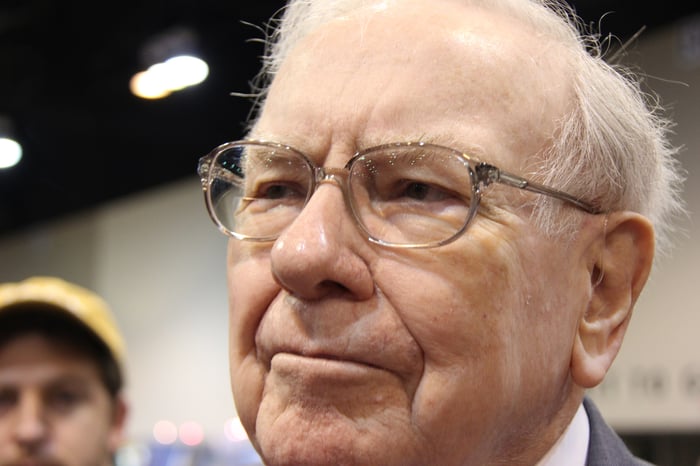For nearly six decades, Berkshire Hathaway (BRK.A -0.30%) (BRK.B -0.26%) CEO Warren Buffett has been a veritable money machine for his investors. Since taking the reins as CEO, the Oracle of Omaha, as he's come to be known, has created almost $660 billion in value for shareholders (which includes himself) and delivered an aggregate return of 3,641,613% for the company's Class A shares (BRK.A) between the beginning of 1965 and end of 2021. For context, the broad-based S&P 500 delivered a total return (i.e., including dividend paid) of "just" 30,209% over the same 57-year span.
Because of Buffett's incredible track record, everyone from Wall Street professionals to everyday investors follows his buying and selling activity via 13F filings with the Securities and Exchange Commission. A 13F is a required quarterly filing by money managers with at least $100 million in assets under management that provides a snapshot of what these successful investors were buying, selling, and holding in the most-recent quarter.

Berkshire Hathaway CEO Warren Buffett. Image source: The Motley Fool.
This number demonstrates why the Oracle of Omaha is crushing Wall Street's benchmark index
While there is no shortage of factors that have contributed to the Oracle of Omaha's success as an investor over the past 57 years, one number has stood out as the unquestioned key cog to Warren Buffett's outperformance. That number is, very simply, a representation of patience.
Warren Buffett's 10 largest holdings by market cap have been held for an average of 49.4 quarters, by my own calculation, which equates to over 12 years per holding. In other words, Buffett's success is dependent on using time as an ally.
Although Warren Buffett and his investing lieutenants, Todd Combs and Ted Weschler, will, on rare occasion, make short-term trades or seek arbitrage opportunities -- Berkshire Hathaway's Activision Blizzard position is a perfect example of a rare arbitrage opportunity -- Buffett has predominantly made a living by purchasing great companies at a fair price and holding them for long periods.
Winning stocks keep winning
The advantage of buying and holding is simple: Winning businesses continue winning over the long run. For instance, Coca-Cola (KO 0.31%) may not be the growth story it once was, but it's still a company that continues to move the needle steadily higher over the long-term. It has an operating presence in all but three countries worldwide (North Korea, Cuba, and Russia), controls 20% of cold beverage market share in cash flow-predictable developed markets, and generates higher organic growth rates from emerging markets. It's also Warren Buffett's longest-held stock. Coke has been a continuous holding for 34 years and counting.
Although it's not a top-10 holding by market cap, insurance company Globe Life (GL -3.89%) is another great example of winners that keep winning. Globe Life is one of the longest continuously held stocks in Berkshire's portfolio at 21 years.
Let's face it, selling life and health insurance products isn't an exciting or fast-paced operating model. However, it's a business model that affords Globe Life exceptional premium pricing power, which has translated into profits that have expanded over long stretches of time. In short, Buffett learned quickly that buying boring businesses can be beneficial from an investment perspective.

Image source: Getty Images.
Patience pays off handsomely with dividend stocks
Buying and holding also allows the Oracle of Omaha to reap the rewards of dividend income from his many passive-income powerhouses over time. Over the next 12 months, Berkshire Hathaway is on track to collect well over $6 billion in dividend income, with much of this coming from a select handful of companies.
Dividend stocks are almost always profitable, time-tested, and have transparent long-term growth outlooks. Further, studies have shown that income stocks have run circles around their non-dividend-paying peers in the return column over multiple decades. In other words, they're the perfect candidates to buy and hold.
Patience has certainly "paid dividends" for the Oracle of Omaha. Even though the current respective yields for Coca-Cola, credit ratings agency Moody's (MCO -1.58%), and payment processor American Express (AXP -0.84%), are nothing to write home about, Berkshire Hathaway's cost basis on these companies is so low that Buffett and his team generate jaw-dropping yields. With Coke, Moody's, and American Express being held for 34 years, almost 22 years, and 29 years, respectively, it's perhaps no surprise their yields relative to cost are now 54%, 28%, and nearly 25%.
Historically, patience has been handsomely rewarded. ^SPX data by YCharts.
Emotions are largely removed from the equation
Furthermore, Warren Buffett's long-term approach to investing helps remove the emotions that can get in the way of sound judgment and analysis.
As a whole, investors are terrible at trying to time the market. While you might get lucky, on occasion, trying to time when corrections will occur simply can't be done with any consistency over long time frames.
Warren Buffett is well-aware that contractions and recessions are a natural part of the economic cycle. Rather than foolishly trying to time when they'll occur, the Oracle of Omaha plays his own numbers game by packing Berkshire Hathaway's portfolio with time-tested, cyclical businesses.
Though recessions are inevitable, they often last just a couple of quarters. Meanwhile, periods of expansion are almost always measured in years. The disproportionate amount of time the U.S. economy spends expanding, relative to contracting, favors patient investors like Buffett who take the long view.
While established companies like Coca-Cola, Moody's, American Express, and Globe Life, might experience temporary operating weakness during recessions, they've also demonstrated that they can thrive during long-winded periods of expansion.






